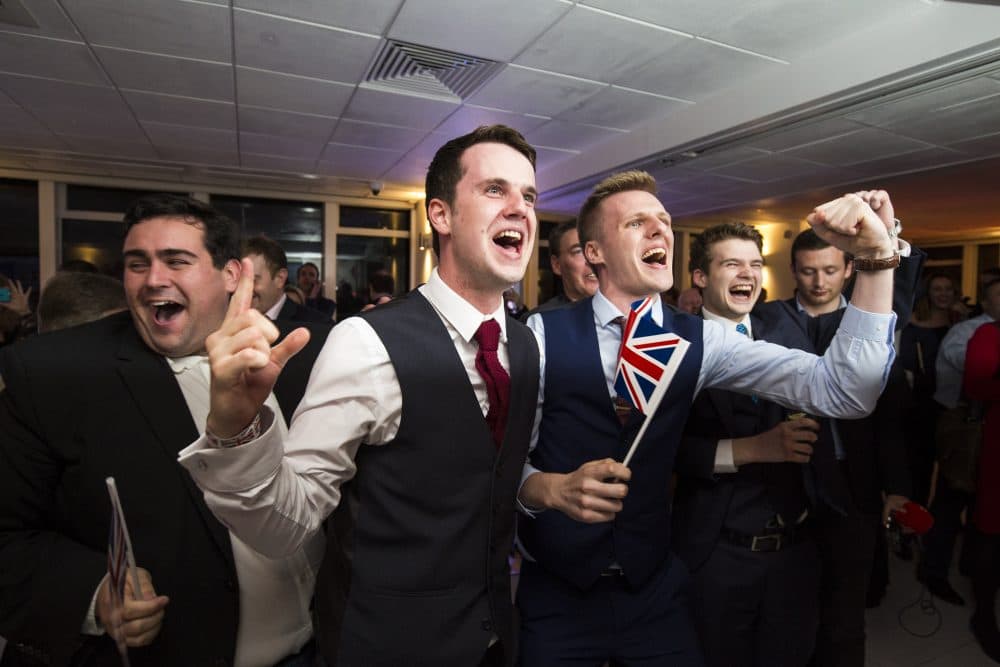Advertisement
Britain Votes To Leave EU: Cameron To Resign, Markets Rocked

Note: Here & Now will be airing continuing coverage of the Brexit vote throughout today's program.
Britain voted to leave the European Union after a bitterly divisive referendum campaign, toppling the prime minister Friday, sending global markets plunging and shattering the stability of a project in continental unity designed half a century ago to prevent World War III.
The decision launches a yearslong process to renegotiate trade, business and political links between the United Kingdom and what would become a 27-nation bloc, an unprecedented divorce that could take decades to complete.
"The dawn is breaking on an independent United Kingdom," said Nigel Farage, leader of the U.K. Independence Party. "Let June 23 go down in our history as our independence day!"
Prime Minister David Cameron, who had led the campaign to keep Britain in the EU, said he would resign by October and left it to his successor to decide when to invoke Article 50, which triggers a departure from European Union.
"I will do everything I can as prime minister to steady the ship over the coming weeks and months," he said, "but I do not think it would be right for me to try to be the captain that steers the country to its next destination."
Polls ahead of the vote had shown a close race, and the momentum had increasingly appeared to be on the "remain" side over the last week. But in an election Thursday marked by notably high turnout - 72 percent of the more than 46 million registered voters - "leave" won with 52 percent of the votes.
The result shocked investors, and stock markets plummeted around the world, with key indexes dropping 10 percent in Germany and about 8 percent in Japan and Britain.
The euro fell against the dollar and the pound dropped to its lowest level since 1985, plunging more than 10 percent from about $1.50 to $1.35 before a slight recovery, on concerns that severing ties with the single market will hurt the U.K. economy and undermine London's position as a global financial center. Bank of England Gov. Mark Carney sought to reassure the markets.
Advertisement
"We are well prepared for this," Carney said. "The Treasury and the Bank of England have engaged in extensive contingency planning. ... We have taken all the necessary steps to prepare for today's events."
Also seeking to calm frayed nerves was the most prominent "leave" campaigner, Boris Johnson. Taking a somber tone unusual for the flamboyant former London mayor, he described the EU as a noble idea which was no longer right for Britain. He said the result in no way means the United Kingdom will be "less united" or "less European."
Even as he spoke, however, Scotland's First Minister Nicola Sturgeon said a second Scottish referendum on independence from the United Kingdom is now "highly likely." Scotland voted in 2014 to remain a part of the U.K. but that decision was seen by many as being conditional on the U.K. remaining in the EU.
Britain would be the first major country to leave the EU, which was born from the ashes of World War II as European leaders sought to build links and avert future hostility. With no precedent, the impact on the single market of 500 million people - the world's largest economy - is unclear.
Leaders from across the EU voiced regret at the British decision. Germany called top diplomats from the EU's six founding nations to a meeting Saturday, and the president of the European Council, Donald Tusk, said the bloc will meet without Britain at a summit next week to assess its future. Tusk vowed not to let the vote derail the European project.
"What doesn't kill you, makes you stronger," he said.